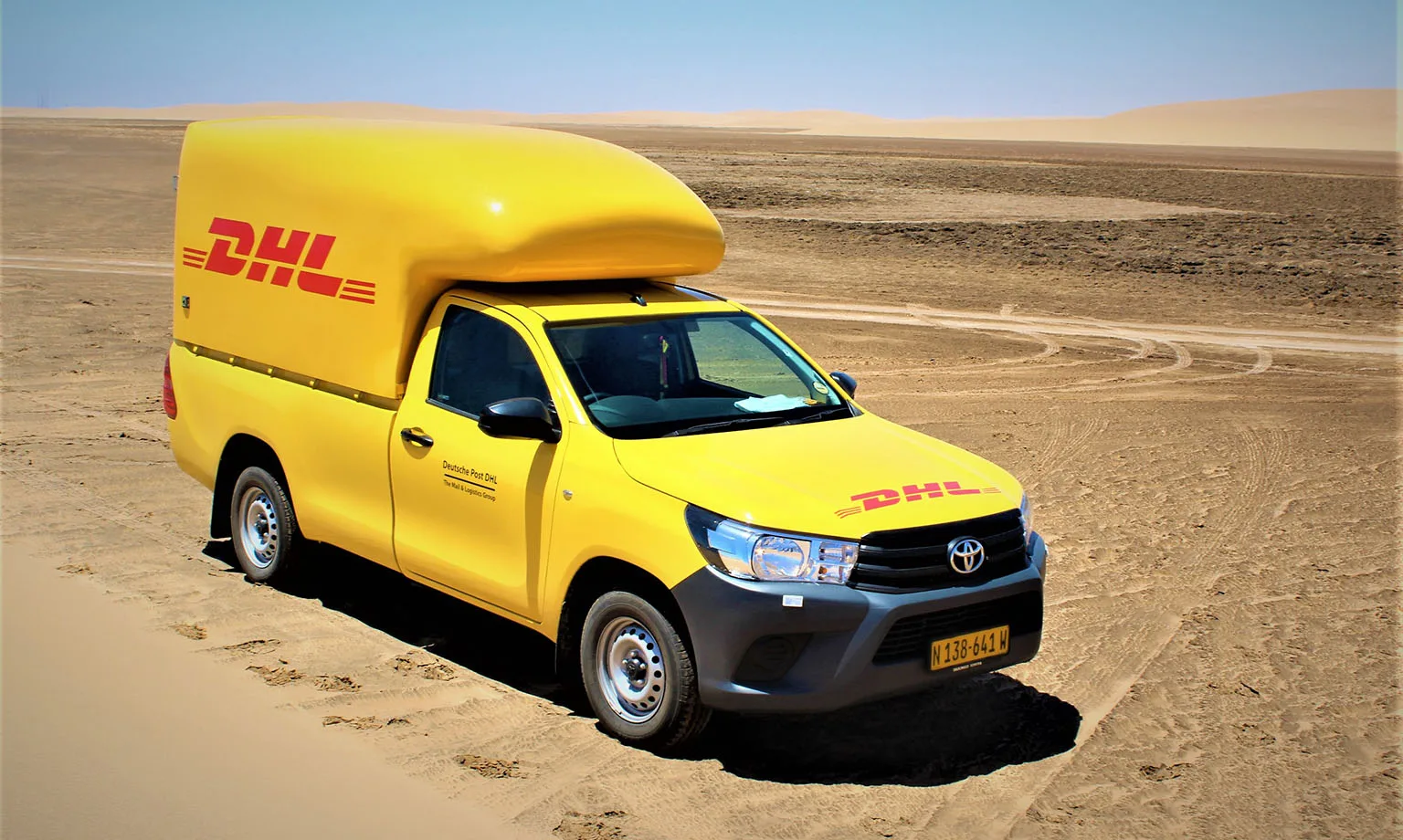Dirk S. van Doorn, Managing Director of DHL Namibia, discusses the company’s well-established presence in Namibia as a first-choice logistics partner, its ongoing support for the mining and oil and gas industries, and aspirations for sustainable expansion.
THE FULL PACKAGE
Established as a key player in Namibia’s logistics and courier industry over 35 years ago, DHL Namibia boasts a proud history.
Initially expanding into the Namibian market as part of DHL’s global strategy to provide efficient and reliable express delivery services around the world, the move aimed to meet growing logistical needs across Africa’s various sectors, ranging from mining, fishing, and agriculture to government services.
More recently, DHL Namibia has expanded into oil and gas logistics services, as well as green hydrogen, which have the potential to become significant contributors to the country’s economy.
“DHL Namibia’s journey over the past 35 years reflects its commitment to serving the nation’s logistical needs while continually evolving to meet new market demands, making it a cornerstone of Namibia’s logistics infrastructure,” opens Dirk S. van Doorn, Managing Director.
Headquartered in Windhoek with a key port city location in Walvis Bay, two agents in Lüderitz and Swakopmund, and 16 retail partners across the country, the company offers a wide range of express logistics solutions supported by a robust network of 110 direct and indirect staff members.
As such, DHL Namibia plays a pivotal role in connecting the nation’s business individuals to global markets whilst ensuring reliable and fast delivery services across Namibia.
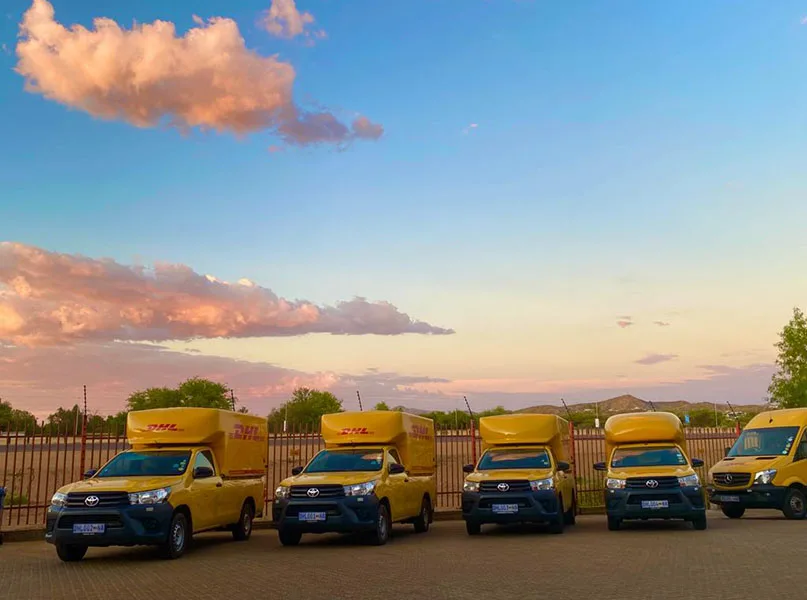
A TRANSPARENT SUPPLY CHAIN
One of the country’s leading logistics providers, DHL Namibia has been instrumental in providing business-to-business (B2B) transport services between key sectors, including mining, agriculture, manufacturing, retail, oil and gas, and green hydrogen.
Offering everything from customised express freight services to supply chain optimisation, the company not only handles the movement of large equipment and regular supply shipments but manages warehousing, inventory, distribution, and last-mile delivery as part of its B2B offering.
For businesses involved in overseas trade or international partnerships, DHL Namibia also provides cross-border and international end-to-end logistics solutions, including guidance on customs clearance and regulatory compliance.
To substantiate its reliability and provide B2B customers with full transparency, the company offers various monitoring and supply chain management solutions.
“Our integrated, advanced tracking and shipment management systems allow our clients to monitor their goods in real-time,” van Doorn details.
To complement this, a My DHL+ solution enables customers to manage several aspects of their supply chain themselves through the use of DHL proprietary software.

“DHL Namibia’s journey over the past 35 years reflects its commitment to serving the nation’s logistical needs while continually evolving to meet new market demands, making it a cornerstone of Namibia’s logistics infrastructure”
Dirk S. van Doorn, Managing Director, DHL Namibia
SUPPORTING THE COUNTRY’S CRITICAL SECTORS
Responsible for a substantial 14 percent of Namibia’s GDP, the country’s mining sector is a key driver of the economy – and one in which DHL Namibia plays a crucial role.
For instance, when it comes to the transportation of large, heavy, and sensitive mining machinery or the supply of essential materials, DHL Namibia offers extensive road and air freight services alongside end-to-end logistics solutions.
“Supplemented by the company’s worldwide connectivity, we often partner with international mining suppliers and contractors who are able to import specialised equipment from global markets efficiently,” van Doorn elaborates.
Furthermore, DHL Namibia assists mining companies in navigating the often complex regulatory and customs requirements for importing and exporting goods. Such requirements are especially important in the mining industry, which often deals with shipments that must meet stringent regulations.
“DHL Namibia’s close relationship with the mining industry showcases its ability to support the country’s critical sectors with tailored, reliable, and high-capacity logistics solutions,” he affirms.
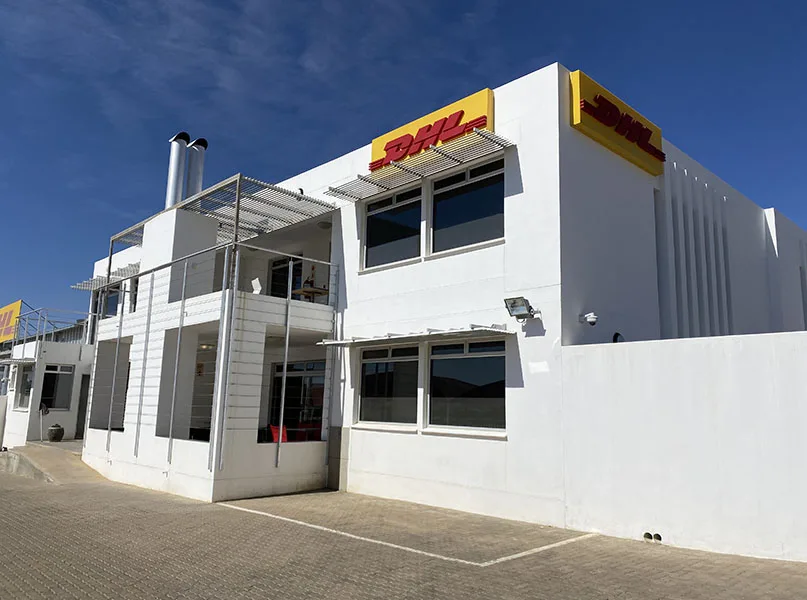
TRANSPORTATION TO SUPPORT EXPLORATION
Over the last 18 months, DHL has played a key role in supporting oil exploration projects off the coast of Namibia, transporting specialised exploration equipment to the necessary sites.
“These oil discovery projects, particularly those in offshore regions such as the Orange
Basin, have been a major focus for us due to the nation’s increasing prominence as a potential oil and gas producer,” van Doorn outlines.
Key aspects of DHL Namibia’s involvement include the transportation of heavy exploration equipment, such as seismic survey tools, drilling machinery, and underwater inspection devices, alongside coordination with DHL’s international network, which spans 220 countries and territories, to secure supplies and equipment.
“This includes managing customs clearance and regulatory requirements to ensure the smooth importation of the necessary equipment,” he points out.
Not only is DHL Namibia involved in the initial transportation stages of these projects, but it also provides day-to-day support for oil exploration operations, including transporting spare parts and geological samples to offshore rigs, always ensuring operations run seamlessly.
Meanwhile, given the environmental sensitivities surrounding offshore oil exploration, the company complies with local environmental regulations so that its transportation processes fall in line with international environmental health and safety standards.
“We support exploration efforts while adhering to strict sustainability protocols to minimise environmental impact,” van Doorn explains.
Through its involvement in oil discovery projects, DHL Namibia has demonstrated its ability to handle complex logistics operations in high-stakes industries, moving critical equipment efficiently and reliably to advance the country’s burgeoning oil and gas exploration efforts.
“DHL Namibia’s close relationship with the mining industry showcases its ability to support the country’s critical sectors with tailored, reliable, and high-capacity logistics solutions”
Dirk S. van Doorn, Managing Director, DHL Namibia
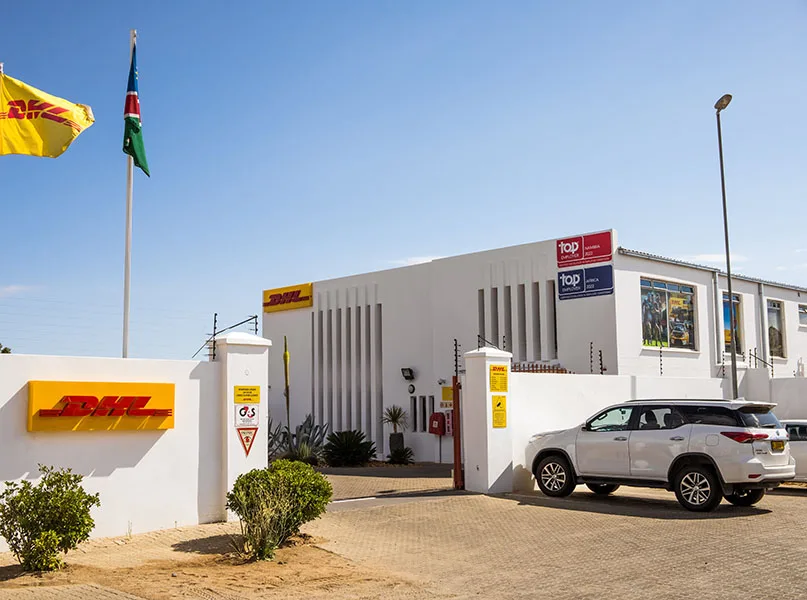
IN IT FOR THE LONG-HAUL
Driven by a growing demand for cross-border trade and the transportation of goods between South Africa (SA) and Namibia, DHL Namibia has noted a significant increase in road haulage between the two nations.
Given that SA is Namibia’s largest trading partner, the upsurge in road freight reflects broader economic activity in sectors such as manufacturing, retail, mining, and agriculture.
“Another factor contributing to increased road freight has been as a result of the Johannesburg OR Tambo Airport acting as a key aviation gateway for Southern Africa,” van Doorn highlights.
This increase has led to the company transporting larger volumes of goods between the two nations, including finished goods and critical supplies, bolstering Namibia’s key industries, which rely heavily on imports from SA.
On top of this, more frequent road transport services, additional direct routes, and optimised scheduling have allowed DHL Namibia to reduce delivery times for its clients in both nations.
However, the surge in road haulage has also increased the company’s workload in terms of volume, operational demands, and customs management. To account for this, DHL Namibia has contracted a larger fleet of trucks through its accredited provider and enhanced its logistics infrastructure to handle more shipments daily.
Overall, increased trade between Namibia and SA, supplemented by the company’s expert logistics solutions, has positively impacted both countries’ economies, facilitating smoother trade and helping local businesses to expand their market reach.
“DHL Namibia’s role in this process has reinforced its position as a critical logistics partner for many Namibian businesses,” van Doorn prides.
Strengthening cross-border relations and enabling the company to better serve key industries, this expansion positions DHL Namibia as a crucial integrator in the region.
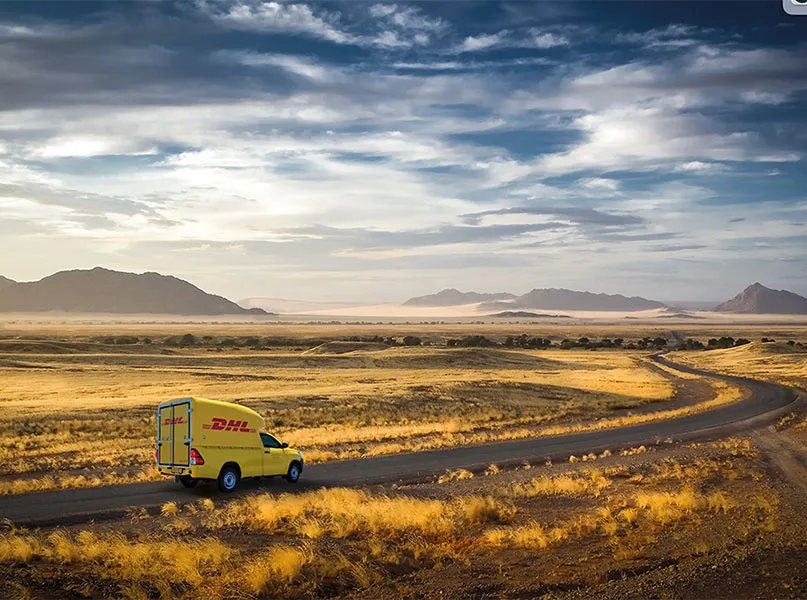
A CONNECTED AND SUSTAINABLE FUTURE
Committed to the growth of the nation’s economy, DHL Namibia continues to invest in resources to ensure it is ready and able to serve key industries such as mining, agriculture, retail, and oil and gas.
For example, with plans in place to open additional branches and logistics hubs in underserved areas of Namibia, the company hopes to establish a stronger national presence, especially in remote locations where industries like mining and agriculture are expanding.
“By establishing a stronger presence in regions across the northern and southern parts of Namibia, we aim to improve access to our logistics services for both businesses and individuals with a focus on small to medium-sized enterprises (SMEs),” van Doorn confirms.
Meanwhile, DHL Namibia also seeks to enhance its rural connectivity to ensure faster and more reliable delivery services across its South African trade routes, expanding its presence along key trade corridors and connecting Namibia to SA, Botswana, Angola, and Zambia.

With intentions to further develop operations along its Walvis Bay corridor, a major trade route connecting Namibia to the rest of Southern Africa, the company leverages the strategic location as a potential hub for oil and gas support.
Elsewhere, DHL Namibia’s ongoing investment in digital infrastructure and e-commerce logistics services, such as warehousing, fulfilment, and last-mile delivery, will support the booming online retail sector alongside improving service delivery, customer experience, and operational efficiency.
Finally, the company’s continued expansion will see it invest in sustainable infrastructure such as eco-friendly, energy-efficient warehouses, whilst its global GoGreen programme seeks to increase the use of Sustainable Aviation Fuel (SAF) and become the market leader.
Meanwhile, DHL Namibia continues to use electric and fuel-efficient vehicles, invest in renewable energy, and implement carbon-neutral shipping options.
“We seek to widely integrate sustainability into our supply chain operations, promoting greener logistics practices across the board,” van Doorn concludes.



